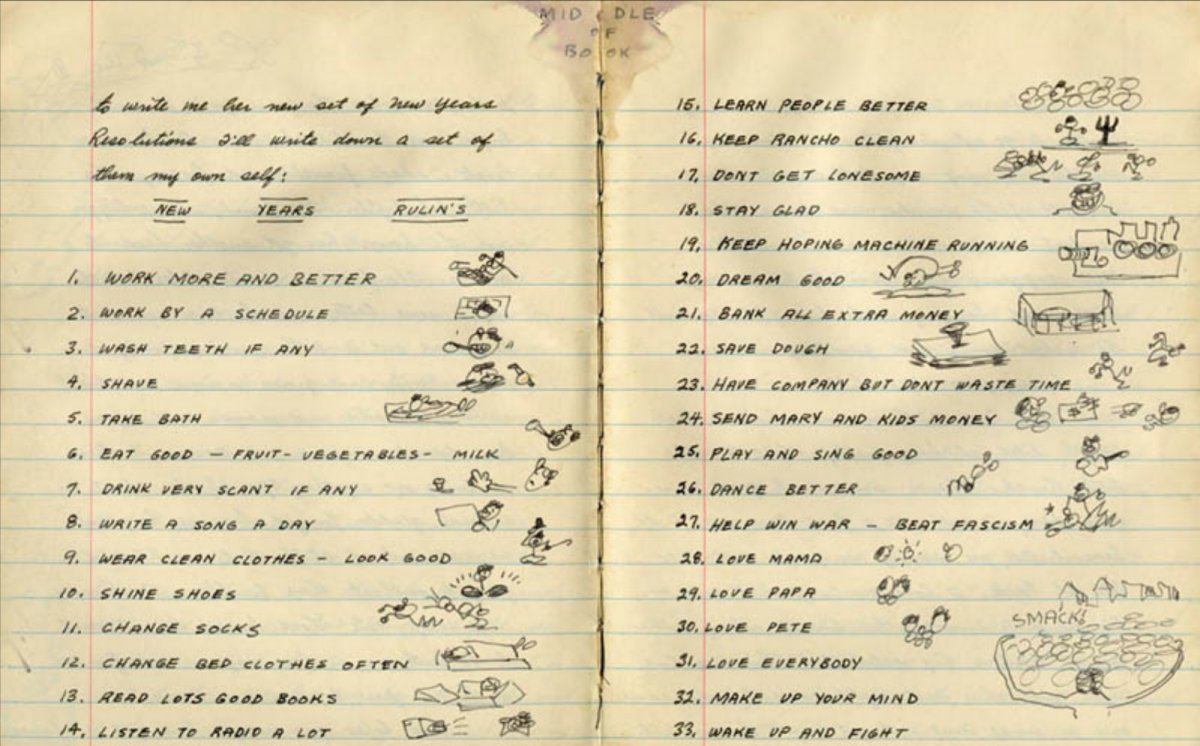I re-read Woodie Guthrie’s New Year’s Resolutions–“New Years Rulin’s” he calls them–as a brief reminder to myself that these exist and can be salubrious. I have spent a lot of time in 2018 mired in some dirty mud, as if addicted to it and as if it helps me. Advancing upon middle age, I wonder to myself if I will ever feel the sting of incipient mortality upon me. Will I start worrying that time will run out, and thus I should actually do the things I keep intending to do? Or will I spend the next forty or so years still holding off on doing those things because I need another hit of . . . the mud?

Guthrie’s “27. Help win war – beat fascism” holds new significance to me now. As does “33. Wake up and fight.” Suddenly the urgency of those Rulin’s make sense. His personal care ones, such as “6. Eat good” and “7. Drink very scant if any” and “12. Change bed clothes often” also hit home for me.
Every year. . . every day damnitall . . . I make the same goals and have the same intentions. I realize what a cliché I am too. I also realize that the things holding me back are the same ones that hold everyone back: internet scandals to check in on, personal nemeses to check up on, endless scrolling through pictures to confirm and/or undermine self-loathing, and so forth. I also use social media for good, I think: much of my intellectual life now is a result of things I learned from people on Twitter.
I spent an hour uploading all my book purchases from Amazon onto my Goodreads account. I looked through all my book purchases on Amazon, beginning with those I bought at the end of college. Apparently I was really stanning my religious studies professor, because I bought all of his books as well as those written by his best friend. I also bought some Aquinas and Plato and other books I had and have literally no interest in reading. Then there is a spate of education and literacy texts from my high school teaching and master’s degree days. Snore! I can see the person who I was trying to be through all those phases of book-buying. How few I read! Some of those books no longer live on my shelves! Look at grad school go by! SO much Said. All the Buddhism that I now renounce.
A couple of years ago I came up with a mantra to govern my year’s efforts: Function over form (I spend too much time futzing with form – I mean even deciding on a font for a syllabus occupies hours a semester). There were a few other bits to this mantra that I can’t remember (shows how little I followed it). This year, I want to Read More than I Scroll. And I want to Write More than I Binge-Watch. To that end, I’m going to use Goodreads to track my reading and am going to keep the blog as part of my writing routine. I also will write about teaching on my official website. This site will function more as a journal than anything else.